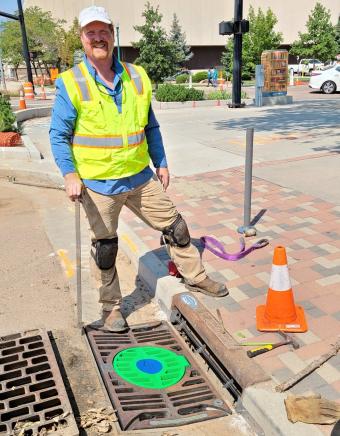Entrepreneurial engineer aims to thwart water pollution one storm drain at a time
Brian Deurloo ’97 was recently listed on the Forbes Next 1000 of 2021 list

When Brian Deurloo ’97 was a kid, he found out his neighbor was buying frogs—his favorite animal—at a quarter a pop. He showed up with a half-bucket of frogs. That was his first foray into entrepreneurship.
In 2016, Deurloo left his oil and gas and mining career to start Frog Creek Partners, an environmental technology company that focuses on his passion for stormwater pollution mitigation. The mining engineering grad is an inventor with four U.S. patents and four registered trademarks. The first is technology for magnetic cigarette butts, and the other three are for his commercialized invention, The Gutter Bin® stormwater filtration system, which helps keep cigarette butts and other trash out of the rivers and oceans water supply.
“I’ve hated cigarette butts since I was a kid,” he said. “I thought, wouldn’t it be cool if you could pick them up with a magnet? I filed the idea away.”
The spark of an invention
Fast forward to 2015. Deurloo and his wife emerged from the Bell in Hand Tavern in Boston and saw the 220-year-old cobblestone storm drain clogged with cigarette butts. Disgusted, he wondered where the trash went—to the water treatment plant or the bay? He discovered the stormwater goes into the ocean or the river. Worldwide, about 4 trillion cigarette butts hit the ground every year, he said, potentially poisoning the water supply with nicotine, which is one of the strongest insecticides in the world. It’s known to kill fish quickly.
“I remembered my idea about using a magnet to pick up the butts, and I decided to design and patent it,” he said.
Deurloo looked for help at Mines, and was introduced to Terry Lowe, a research professor in the George S. Ansell Department of Metallurgical and Materials Engineering. He took his idea to Lowe to get advice about building and patenting the invention.
“I remember sitting in the metallurgical lab—I hadn’t been in that building since 1990,” he said. “Dr. Lowe told me the idea is great, but it’s a (terrible) business. Even though he was skeptical, he agreed to work with me. But he suggested I find another idea for solving the problem that could actually make money.”
Four nights later, Deurloo sat up in bed at 2:37 a.m. with a vision of a gutter filter that would capture debris, including cigarette butts. By 3 a.m. he started creating a cardboard protype in his garage, and at 4 a.m. he was at Walmart buying supplies. A few months later, he entered a University of Wyoming startup challenge and won it.
The Gutter Bin®
His invention is called The Gutter Bin®, an adjustable funnel system that is installed into storm drains to direct polluted water into a patented water filter that can be quickly and easily removed, weighed, discarded and recycled.
Today, his company partners with The Greenway Foundation, MYCELX and Rotary International clubs. Frog Creek Partners has installed Gutter Bins at the Denver Zoo, in Vail, Fort Collins and Sheridan, Wyo., and many other places. There are even several Gutter Bins at the new Meow Wolf arts collective in downtown Denver.
What’s more, the Microsoft Community Environmental Sustainability Initiative made a $100,000 grant to Frog Creek Partners and the Rotary Club of Cheyenne, Wyo. to install 64 Gutter Bins in Cheyenne to help restore and protect Crow Creek from the threat of stormwater pollution, according to a media release. The filters should capture three tons of pollution a year.
His latest project is with the City of Colorado Springs, which is required to spend $460 million on stormwater infrastructure in the next 20 years after being sued by the EPA and the State of Colorado for polluting Fountain Creek and the Arkansas River.
“We just installed 12 Gutter Bins in Colorado Springs, which kicked off the clean water challenge there,” he said. “We want to do more public-private partnerships and to get sponsors to help. Our goal is to get highly networked people to focus money on cleaning up stormwater. We want to get the community to get involved in cleaning up their own river, so we’re also partnering with local Rotary clubs.”
Forbes takes notice
Deurloo’s work is getting noticed nationally, too. He was just listed on the Forbes Next 1000 of 2021, which showcases inspirational entrepreneurs with under $10 million in revenue.
“I was blown away that they chose me,” he said. “If you would have asked me if this would happen five years ago, half of me would say no way, and the other half would say why did it take so long. I was happy to receive that vote of support. It tells me I’m on the right track.”
Deurloo, who lives in Casper, Wyo. with his wife and daughter, also won the Casper Start-Up Challenge, which gained him a grant and an office.
“I’m dreaming big,” he said. “I want it to be the most impactful environmental company in the world. Nicotine pollution is a worldwide problem. My new goal is creating an economical means to clean up storm drains and rivers around the world.”
A Mines education is behind it all
Deurloo recounted the classic Mines story of sitting in freshman orientation in 1991 and being told that only some of the students sitting around him would graduate. He looked around and thought sorry, guys, I’m going to be the one who makes it.
Deurloo played football and basketball and worked in the athletics department for a short time. Quickly, though, he decided to focus on his studies. He enjoyed competing in the E Days competitions. In 1995, he won the Ultimate Miner and All-Around Miner competitions.
“Mines prepares you to be thorough and accurate with your thinking,” he said. “I didn’t do well in dynamics or statistics. I passed. But I apply both to my inventions all the time. I wouldn’t be as good of an inventor if I hadn’t gone to Mines.”
Deurloo took a year off from college to work and play in Australia. That trip opened his eyes to the rest of the world and made him appreciate living outside the United States. When he graduated, he worked in oil and gas in Wyoming, then found positions—two of them through Mines connections—that took him to Australia, Vietnam and Brazil.
“In Vietnam, I remember seeing bamboo scaffolding stacked 20 stories high,” he said. “In America, that wouldn’t pass OSHA. But when you look at how it’s put together, you see the amazing ways other cultures use engineering and the resources at hand.”
Deurloo followed in his family’s footsteps by attending Mines. His father, Robert, graduated in 1969 with a degree in Mining Engineering. His uncle Doug Tippie, also a Mines grad, has a memorial scholarship named after him. It provides $1,000 and a prize to a petroleum engineering student each year, with caveats: the student must have a GPA lower than 2.9 GPA and they can’t spend a penny of the award on school. Whether they drink or share the case of scotch that comes with the award is up to them.
“I love that my family has given back to Mines,” he said. “It inspires me to do that too someday.”
Today, Deurloo is an inventor, an entrepreneur, a beekeeper, a dad and husband. He loves living in Wyoming, and he has a beautiful vision for the world with clean water flowing everywhere. He wants Mines students to follow in his footsteps.
“I’m quite proud to be a Mines alum,” he said. “The education that I received there was top notch. Mines was hard. I hope today’s students use what they learn at Mines to build beautiful things that will help glorify nature rather than take away from it.”




